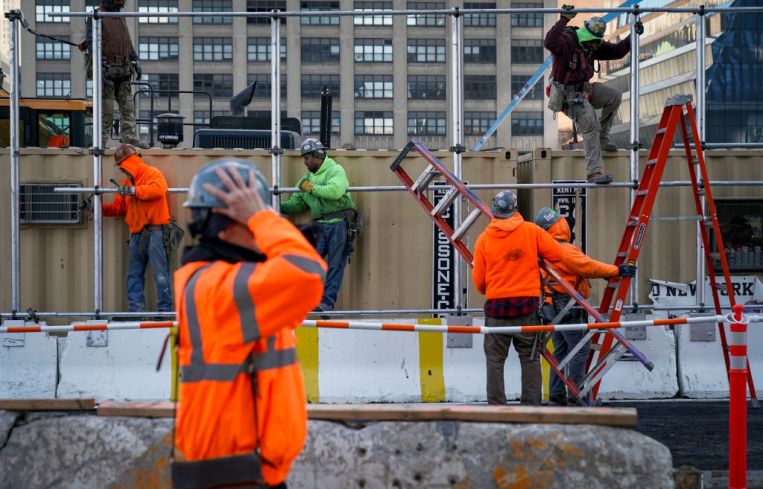NYC Residential Construction Spending Expected to Hit $26B Despite Permits Decline
By Rebecca Baird-Remba October 18, 2023 4:16 pm
reprints
The New York Building Congress (NYBC), a trade group for the construction industry, claims that residential construction spending in the city will rise slightly this year, even amid a sharp decline in new residential building permits.
The trade group’s 2023 report projects that developers will spend $26.4 billion on residential construction this year, of which the majority will be renovations, rehabilitations and conversions. That figure would represent a modest, inflation-adjusted increase of about $527 million compared to 2022.
Ground-up apartment buildings and homes account for only 23 percent of the 54.6 million square feet of residential space under construction in 2023, according to the NYBC. Another 28 percent is unspecified “interior work” — presumably renovations and upgrades — while more intensive renovations and additions account for the remaining 49 percent.
All told, the trade group projects only 11,300 residential units will be built in New York City this year, falling significantly short of its projected 30,000-unit benchmark. NYBC blames the precipitous decline in residential development on the expired 421a tax exemption, which the New York State Legislature has failed to replace since the tax break expired in June 2022.
Higher interest rates have also helped put the brakes on new development, with new residential construction in the city costing builders $480 per square foot this year. The NYBC also recommends that the state legislature support new transit-oriented development and roll back the New York City-specific cap on new residential floor area.
The Real Estate Board of New York (REBNY) recently painted an even more dire picture of the residential construction market in the five boroughs. The real estate trade outfit found that filings for new building foundations were down 81 percent year-over-year in the first eight months of 2023.
Developers moved forward with 6,542 residential units, down from 34,710 proposed units in new foundation filings from January to August of 2022, according to REBNY. Over the summer, foundation filings for buildings with 100 or more apartments dropped below the monthly average of seven for the first time since April 2021, with developers filing for two, four and three large residential buildings in June, July and August of this year, respectively.
Spending on nonresidential projects like hotels, offices, industrial space and life science labs is also rising significantly, the NYBC report found. The share of spending on nonresidential projects is expected to account for 42 percent of all construction spending in 2023, up from 34 percent in 2022. All told, developers are expected to spend $35 billion on new commercial construction and renovations this year, up from $22 billion last year.
Government construction spending is also expected to hit $22 billion this year, with city and state governments financing work on schools, infrastructure, city office buildings, transit infrastructure and roads, according to the NYBC. In fiscal year 2023, the city spent $9 billion on construction and design, with the New York City Department of Education accounting for the largest chunk, at $3 billion.
Meanwhile, the Metropolitan Transportation Authority is expected to invest $30 billion over the next three years in signal modernization, track replacement, station renovations and elevator installations. That would be a 47 percent increase in MTA construction spending compared to the period from 2017 to 2019.
Rebecca Baird-Remba can be reached at rbairdremba@commercialobserver.com.



